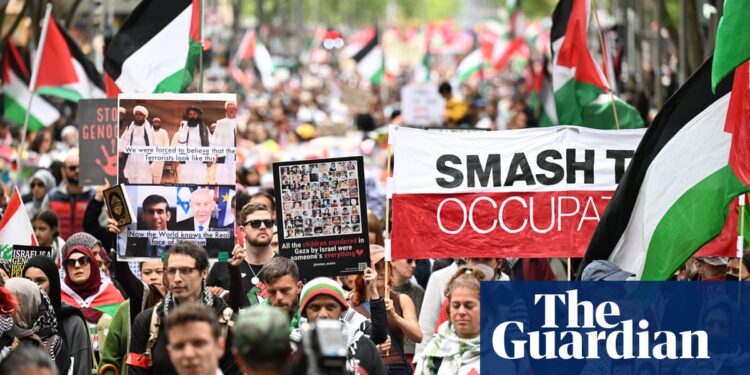Supporters of Palestine have taken to the streets in Sydney and Melbourne, a day before the first anniversary of the 7 October attacks by Hamas in Israel.
Rallies were scheduled to take place in cities across Australia, with demonstrators warned not to display symbols linked to designated terrorist groups such as Hezbollah.
While police in New South Wales had sought to block the Sunday rally from taking place, an agreement reached with organisers allowed the event to go ahead with an altered route.
Protesters gathered with signs and Palestinian flags in Sydney’s Hyde Park, where police had placed two large LED screens telling people not to fly Hezbollah flags or imagery with slain leader Hassan Nasrallah.
In Melbourne’s CBD, people rallied outside the state library, where a speaker led a chant of “there’s no shopping while bombs are dropping” as he directed attenders to march towards Flinders Street.
The crowd was also led in a chant of “from the river to the sea, Palestine will be free”.
The phrase has been the subject of controversy, with some saying that it advocates the eradication of Israel. Others, including Western Australian senator Fatima Payman, have argued that it is not antisemitic.
Earlier on Sunday, the NSW police minister, Yasmin Catley, told reporters that there would be a “significant police presence” on the streets in Sydney.
“Everybody has a right to express their views, but we need to respect each other in doing that,” Catley said.
There will be “no problem whatsoever” if people do the right thing, but if not, “you can expect to be arrested”, she said.
Asked what would happen if any Hezbollah flags were present at the rally, NSW police force assistant commissioner, Peter McKenna, said organisers had agreed no flags or portraits would be displayed.
McKenna said if anyone was found doing so “and are committing an offence, action will be taken”.
Asked if it was against legislation to display a portrait of slain Hezbollah leader Hassan Nasrallah, McKenna said “no it’s not”, but “there is a view in certain circumstances it could be seen as offensive, and we will consider that throughout the operation”.
The deputy prime minister, Richard Marles, said the timing of the protests should have been different.
“The protests that are happening over the course of today and tomorrow are deeply regrettable,” he told ABC’s Insiders program on Sunday.
“The anniversary of October 7 needs to be about October 7, and what happened on that day was the loss of more than 1,000 innocent lives.
“It’s the anniversary of that that we will be remembering today and tomorrow.”
after newsletter promotion
The NSW premier, Chris Minns, said while he supported the right for people to protest in public, the demonstration should not have been organised near the anniversary.
“My view is that it lacks compassion to hold a rally or a demonstration or a protest on that day,” he told Sky News.
“We’ve got an obligation to keep the public safe in a difficult time, and when tensions are high, there’s a high prospect of clashes or violence on Sydney streets.
“Most people would agree that we’re not going to do much about Middle Eastern violence from Sydney, and we have to do everything we possibly can to prevent that kind of violence in Sydney.”
The opposition home affairs spokesperson, James Paterson, said the federal government should have made a bigger effort to persuade community leaders not to have the protest.
Though a decision on whether rallies would be able to go ahead lay with state police forces, Paterson repeated calls for the rally to be held at a different time.
“[Anthony Albanese] should have gone direct to community leaders and used the relationships and the status of the office of prime minister that he holds to say ‘this is unacceptable and it must not proceed’,” he told Sky News.
“We’re not saying that you can’t protest the Palestinian cause, we’re just saying pick any other day of the year than October 7.”
Labor MP Josh Burns said there was no way for the federal government to intervene with the pro-Palestine rallies.
He said Jewish Australians needed to be allowed to grieve on the anniversary.
“I don’t think that the message of protesting on October 7 does anything else other than really make people who are grieving feel even more upset and more uncomfortable,” he told Sky News.
More than 1,200 people were killed on the 7 October attack and 250 were taken hostage, according to the Israeli government.
In response, Israel unleashed a bombing campaign and ground invasion of Gaza, killing almost 42,000 people, displacing 1.9 million and leaving another 500,000 with catastrophic levels of food insecurity, local health ministry sources report.
Israel’s military campaign has now spread to Lebanon as it hunts down senior figures in Hezbollah, a Lebanese militant group backed by Iran and designated a terrorist organisation by Australia.







